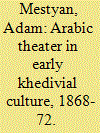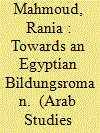| Srl | Item |
| 1 |
ID:
131521


|
|
|
|
|
| Publication |
2014.
|
| Summary/Abstract |
This article revisits the official culture of the early khedivate through a microhistory of the first modern Egyptian theater in Arabic. Based on archival research, it aims at a recalibration of recent scholarship by showing khedivial culture as a complex framework of competing patriotisms. It analyzes the discourse about theater in the Arabic press, including the journalist Muhammad Unsi's call for performances in Arabic in 1870. It shows that the realization of this idea was the theater group led by James Sanua between 1871 and 1872, which also performed ?Abd al-Fattah al-Misri's tragedy. But the troupe was not an expression of subversive nationalism, as has been claimed by scholars. My historical reconstruction and my analysis of the content of Sanua's comedies show loyalism toward the Khedive Ismail. Yet his form of contemporary satire was incompatible with elite cultural patriotism, which employed historicization as its dominant technique. This revision throws new light on a crucial moment of social change in the history of modern Egypt, when the ruler was expected to preside over the plural cultural bodies of the nation.
|
|
|
|
|
|
|
|
|
|
|
|
|
|
|
|
| 2 |
ID:
173357


|
|
|
|
|
| Summary/Abstract |
This paper examines the petitions of a poor woman, Jalila Saʿd, who sought educational opportunities and property from the Egyptian government between 1908 and 1913. Her interest in procuring a ‘place’ for her sons and her family in modernizing Egypt reflects the ways in which non-elites were able to participate in and move within the major physical and discursive public spaces of the era. This study argues that even those at the very edges of society were not categorically marginalized; rather, they were negotiating the dominant spatial hierarchies of their time in attempts to better their circumstances. This ability to navigate and participate in the prevailing discussions and institutions of the time demonstrates that even the most marginalized elements of Egyptian society were quite integrated into the project of ‘modern Egypt’, even if they did not always reap its benefits.
|
|
|
|
|
|
|
|
|
|
|
|
|
|
|
|
| 3 |
ID:
170484


|
|
|
|
|
| Summary/Abstract |
Reading Naguib Mahfouz's Sugar Street (1957) as a Bildungsroman, I argue that Mahfouz creates an Egyptian Bildungsroman that relies on constant revision of European forms and a merging of local and global paradigms to fit the Egyptian socio-historical context. Mahfouz rejects both the traditional Bildungsroman as well as classical indigenous forms as signifiers of mimicry and petrification respectively. While the resolution of the Bildungsroman entails the negation of the Other, whose maturation is requisite upon accepting models that marginalize him/her, classical models render the Other a geographic and temporal anachronism. In place of the traditional Bildungsroman and classical Arabic literary models, Mahfouz advocates for an eclectic paradigm that changes with the historical moment.
|
|
|
|
|
|
|
|
|
|
|
|
|
|
|
|